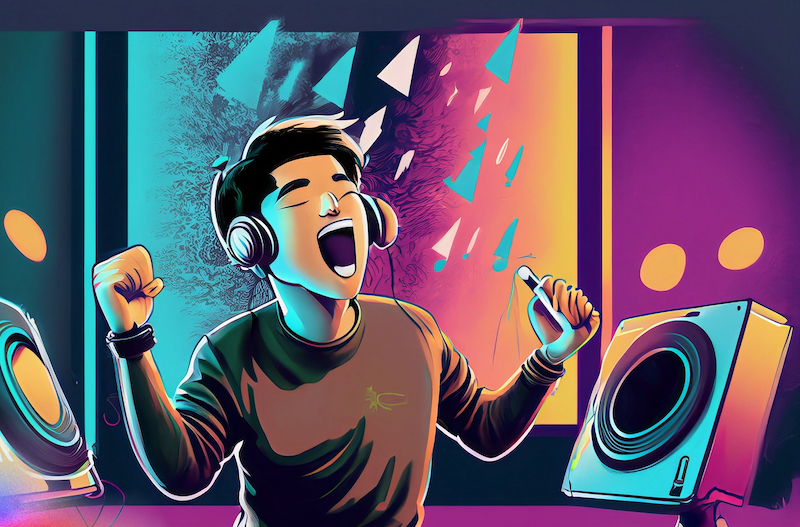Have you ever stopped to consider the power of your voice? 🤔 It’s not just a tool for communication; it’s an extension of your identity, a unique imprint that sets you apart in a world of nearly 8 billion people. But what if you could tweak that identity, even just a little? What if you could choose how you sound, not just in the shower or car, but on a global stage? Welcome to the era of customizable AI Sound, a technological marvel that’s not just changing the way we interact but also raising intriguing questions about culture, identity, and the ethics of voice manipulation.
The impact of AI on the music industry is undeniable. According to Billboard, AI is already being used for everything from songwriting to mastering, and it’s even helping to discover new talent. The New York Times reports that students are now debating the ethics and creative implications of AI-generated music. And as the Musicians Institute points out, AI in music production is not about replacing human creativity but enhancing it. The stakes are high, and the implications are far-reaching. So, as we navigate this brave new world of AI sound, it’s crucial to understand its cultural ramifications. Are you ready to tune in? 🎧🔥
The Evolution of Voice in Technology
Remember the robotic monotone of early text-to-speech programs? Those days are long gone. Today, AI sound generators are capable of mimicking not just the tone, but the emotion, cadence, and even the cultural nuances of human speech. It’s a leap akin to moving from black-and-white television to 4K Ultra HD, and it’s all thanks to advancements in machine learning and neural networks.
The Rise of AI Audio Generators
AI audio generators are not just a fad; they’re a revolution. According to a report by Markets and Markets, the global speech and voice recognition market size is expected to grow from USD 9.4 billion in 2022 to USD 22 billion by 2027. That’s a staggering growth rate, and it’s driven by the increasing sophistication of AI algorithms capable of generating human-like voices. These aren’t just voices that read text; they can sing, shout, whisper, and convey complex emotions. It’s not just about making our devices talk; it’s about making them understand and replicate the very essence of human vocal expression. 🎤🌟
So, as we stand on the cusp of this auditory revolution, it’s time to delve deeper into the cultural implications of customizable AI sound.
Voice as a Form of Identity
In many ways, our voice is a sonic fingerprint, a unique blend of pitch, tone, and timbre that distinguishes us from everyone else. It’s deeply tied to our cultural background, upbringing, and even our emotional state. Think about it: the way you speak can reveal where you’re from, how you’re feeling, and sometimes, even what you believe in. But what happens when technology like AI sound generators allows us to alter this identity? Does it liberate us from societal norms, or does it risk erasing the rich tapestry of accents, dialects, and vocal nuances that define our diverse world?
AI and the Democratization of Voice
AI sound technology is doing something revolutionary: democratizing voice. No longer is the power of a captivating voice reserved for the gifted or trained; now, anyone can generate a voice that’s pitch-perfect or emotionally resonant. This is especially impactful in fields like music and podcasting, where your voice can be your ticket to global recognition. But as we celebrate this newfound accessibility, we must also ponder its implications. Does the democratization of voice dilute its cultural significance? Does it level the playing field, or does it create a new form of inequality where AI-generated voices become the gold standard?
The Ethical Dimensions of AI Sound
On the one hand AI sound technology is a tool for empowerment, enabling people with speech impairments to communicate more effectively or allowing artists to experiment with new forms of expression. On the other hand, it raises serious concerns about authenticity and consent. Just as deepfake technology has sparked debates about the manipulation of visual identity, AI sound generators pose similar ethical questions.
The capability to alter one’s voice so drastically could lead to issues of deception or misrepresentation. Could we reach a point where the authenticity of voice, one of the last bastions of individual identity, becomes as questionable as a Photoshopped image? And let’s not forget the potential for misuse in spreading misinformation or committing fraud.
While much of the ethical debate centers around the mimicking of established artists, these generators offer another, less controversial, avenue: the enhancement of one’s own voice. Imagine being able to fine-tune your vocal range or add a richness to your tone that you never thought possible. For aspiring musicians, podcasters, or even public speakers, this is a game-changer. It’s like having a vocal coach and a recording studio right in your pocket.
It’s crucial to remember that technology itself is neutral; it’s how we choose to use it that defines its ethical standing. AI voice generators have the potential to unlock unprecedented levels of creativity and self-expression. They can give a voice to those who felt they never had one, and amplify the voices of those who wish to share their unique sound with the world.
So, as we navigate the complex ethical terrain of AI sound, let’s not lose sight of the incredible opportunities it offers. After all, every sword has two edges, but it’s how we wield it that ultimately shapes its impact.
Real-World Applications and Implications
The AI song revolution isn’t just a buzzword; it’s a seismic shift in how we create and consume music. From AI-generated background scores in video games to personalized playlists that adapt to your mood, the applications are as varied as they are groundbreaking. Even in the professional music industry, AI is being used for tasks like mastering tracks, sorting through samples, and even composing melodies. The line between human and machine-made music is blurring, and it’s exhilarating to think about the creative collaborations that lie ahead.
AI Voice Maker in Social Media
Social media has always been a platform for self-expression, and AI voice makers are adding a new dimension to this. From TikTok creators using AI-generated voices to add flair to their videos, to Instagram influencers using voice modulation to make their stories more engaging, the applications are endless. It’s not just about entertainment; think about the potential for activism. Customizable voices can help deliver powerful messages in multiple languages or accents, breaking down barriers and reaching wider audiences.
The Pros and Cons of Customizable AI Sound
The Benefits
Let’s dive into the brighter side of customizable AI sound.
- Personalization: Tailor your voice to fit different scenarios, whether it’s a podcast, a song, or a social media post.
- Accessibility: People with speech impairments can use AI to communicate more effectively.
- Creativity Unleashed: The sky’s the limit when it comes to experimenting with sound, offering a new canvas for artists and creators.
- Language and Accent Barriers Broken: AI can adapt your voice to different languages or accents, making global communication easier than ever.
The Drawbacks
Here are some considerations to keep in mind:
- Ethical Concerns: The potential for voice cloning and identity theft is a real issue.
- Loss of Authenticity: With so many modified voices, the value of a ‘genuine’ voice might be diluted.
- Technical Limitations: While impressive, the technology isn’t perfect and can sometimes produce unnatural sounding voices.
By weighing these pros and cons, we can navigate the complex landscape of AI sound with a more informed perspective.
The Future of AI Sound and Cultural Identity
The future of AI sound is not just about better algorithms or more realistic voices. It’s about creating a more inclusive and expressive digital landscape. Imagine AI that can understand the nuances of regional dialects or even the subtleties of emotional tone. The next wave of AI sound technology could redefine how we think about communication, art, and even our own identities.
The Role of AI Sound in the Metaverse
As we venture into the concept of the Metaverse—a collective, virtual shared space created by the convergence of physical and digital realities—the role of AI sound becomes even more intriguing. Could we have AI-generated soundscapes that adapt in real-time to virtual events? Or what about customizable avatars that not only look like us but sound like us too? The possibilities are as endless as they are exciting.
FAQs
What Exactly is AI Sound?
AI sound refers to audio that is generated or modified using artificial intelligence algorithms. This can range from simple text-to-speech applications to complex AI singing voice generators.
How Does AI Sound Affect Culture?
AI sound has the potential to redefine cultural norms around communication and self-expression. It allows for a greater diversity of voices to be heard, both literally and metaphorically.
Is AI Sound Ethical?
The ethics of AI sound are complex and still under debate. While it offers many positive applications, there are also concerns about identity theft, voice cloning, and the potential misuse of technology.
Can I Use AI Sound for Professional Projects?
Yes, AI sound is increasingly being used in professional settings, from music production to voice-over work. However, it’s important to be aware of the ethical considerations and potential limitations of the technology.
How Do I Get Started with AI Sound?
Getting started is easier than ever, thanks to a range of user-friendly AI sound generators and voice simulators available online – try covers.ai for starters! You can use existing AI voice clones for free, or pay a small fee to create your own customized AI voice.

